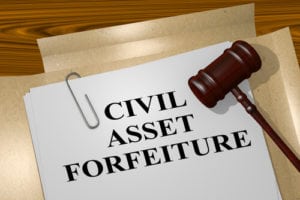 For years, police in Florida have been able to take and profit from stolen property, such as houses, jewelry, and cars, that they have seized themselves based on claims that these items were tied to criminal activity. Historically, police have been able to take property from suspects without any evidence of wrongdoing. In the past, defendants have had to spend considerable amounts of time proving their innocence in costly legal battles to reclaim their property. Just two years ago, Governor Rick Scott prompted a wave of change in civil asset forfeiture procedures in Florida.
For years, police in Florida have been able to take and profit from stolen property, such as houses, jewelry, and cars, that they have seized themselves based on claims that these items were tied to criminal activity. Historically, police have been able to take property from suspects without any evidence of wrongdoing. In the past, defendants have had to spend considerable amounts of time proving their innocence in costly legal battles to reclaim their property. Just two years ago, Governor Rick Scott prompted a wave of change in civil asset forfeiture procedures in Florida.
A law enacted in July 2016 received significant support from Florida lawmakers and a diverse coalition of public interest and law enforcement groups. The law makes noteworthy changes to some of the loopholes that have allowed police to take advantage of civil asset forfeiture.
Major Updates to Florida’s Civil Asset Forfeiture Procedures
Moving forward, when police seek to take property that they believe is involved in a crime, police officers must first arrest the suspect who owns said property. A seizing agency must pay a $1,000 filing fee and up up a $1,500 bond to seize assets. The bond will go to the property owner should he or she be found innocent of the suspected criminal activity.
Police will not need to arrest a suspect when seizing cash; however, the forfeiture of any property will not be permanent unless police can prove beyond a reasonable doubt that the property was not involved in illegal activity. This means that, unless police can prove the cash relates to a crime, they cannot claim ownership of it.
Agencies that make more than $15,000 a year in forfeitures must divert 25% of those profits toward drug treatment, education, or crime prevention programs. The new system also implements a way to track how law enforcement agencies spend the money they make from civil seizures.
Defending your Assets in West Palm Beach
While asset seizure and forfeiture is a civil action, it occurs on the basis of suspected criminal conduct. An attorney who understands the allegations against you can help you show your innocence and fight for your rights to keep the property you own.
Contact attorney Brian Gabriel of West Palm Beach law firm The Law Office of Gabriel & Gabriel to discuss your asset forfeiture case. He’ll gladly provide a free consultation when you call (561) 622-5575, or you can email a brief description of your case, and he will be in touch.


